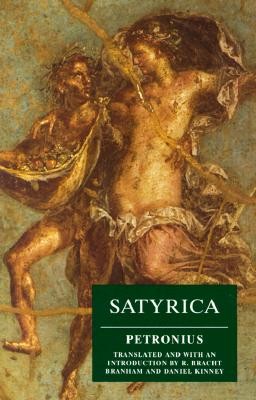| Satyrica Contributor(s): Petronius (Author), Bracht Branham, R. (Editor), Kinney, Daniel (Editor) |
|
 |
ISBN: 0520211189 ISBN-13: 9780520211186 Publisher: University of California Press OUR PRICE: $28.66 Product Type: Paperback - Other Formats Published: April 1996 Annotation: Encolpius, a soldier of fortune, despiser of pedantry, lecherous and contrary, and the beautiful Giton, who lives off his charms, are invited to a gargantuan banquet hosted by the prodigal, pompous, newly rich Trimalchio. When the feast turns into a riot, the two, joined by the down-on-his-luck poet Eumolpus, leave town quickly to avoid trouble. So begins the "Satyrica," a bizarre odyssey through the carnivalesque landscape of Nero's empire. The author of the "Satyrica," Petronius, had been Nero's intimate and advisor on all matters of artistic taste and elegance but a jealous rival turned Nero against him. No longer enduring "the suspense of fear or of hope," Petronius eluded his former patron by ending his own life. His novel has lived on, preserving for centuries tales of a time when virtue and vice, power and money, human comedy and human cruelty, mixed and melded unpredictably. The translation is accurate and contemporary. In addition, a chronology, introduction, and commentary offer the reader background on Petronius's social milieu and on the fascinating complexity of his seemingly low-brow novel's poetic structure. |
| Additional Information |
| BISAC Categories: - Fiction | Classics - Fiction | Historical - General |
| Dewey: FIC |
| Lexile Measure: 1450 |
| Physical Information: 0.64" H x 5.09" W x 7.74" (0.40 lbs) 224 pages |
| Themes: - Chronological Period - Ancient (To 499 A.D.) - Cultural Region - Mediterranean |
| Descriptions, Reviews, Etc. |
| Publisher Description: Encolpius, a soldier of fortune, despiser of pedantry, lecherous and contrary, and the beautiful Giton, who lives off his charms, are invited to a gargantuan banquet hosted by the prodigal, pompous, newly rich Trimalchio. When the feast turns into a riot, the two, joined by the down-on-his-luck poet Eumolpus, leave town quickly to avoid trouble. So begins the Satyrica, a bizarre odyssey through the carnivalesque landscape of Nero's empire. The author of the Satyrica, Petronius, had been Nero's intimate and advisor on all matters of artistic taste and elegance but a jealous rival turned Nero against him. No longer enduring the suspense of fear or of hope, Petronius eluded his former patron by ending his own life. His novel has lived on, preserving for centuries tales of a time when virtue and vice, power and money, human comedy and human cruelty, mixed and melded unpredictably. The translation is accurate and contemporary. In addition, a chronology, introduction, and commentary offer the reader background on Petronius's social milieu and on the fascinating complexity of his seemingly low-brow novel's poetic structure. |